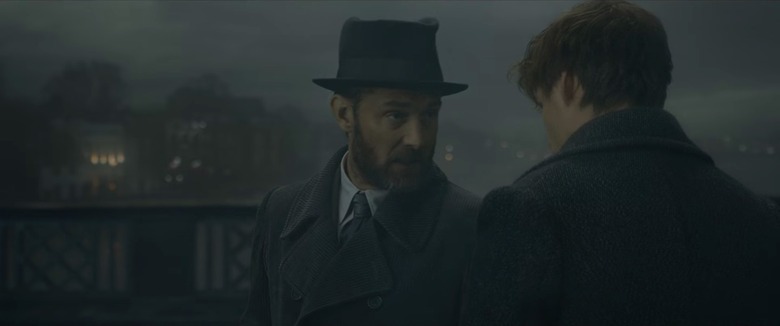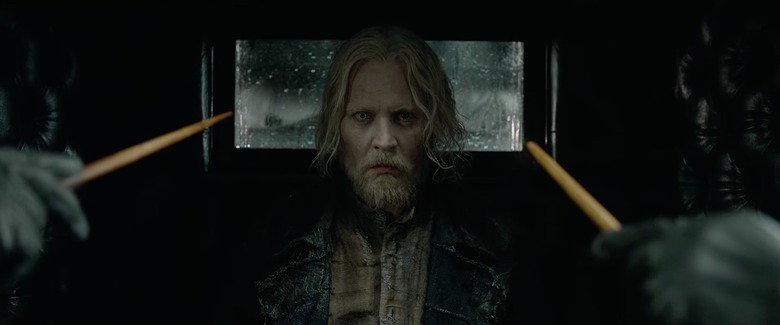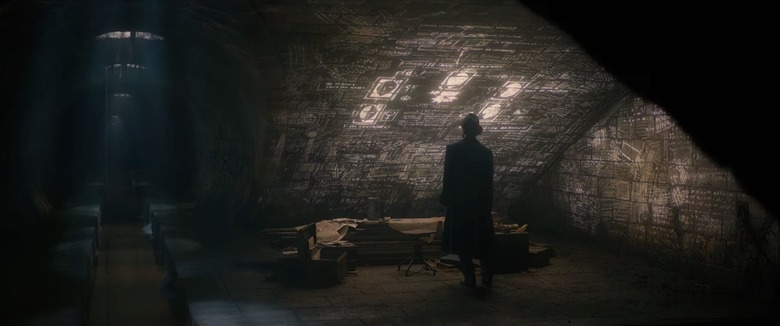The New 'Fantastic Beasts' Trailer Is A Total Bummer For Many 'Harry Potter' Fans
(Welcome to The Soapbox, the space where we get loud, feisty, political, and opinionated about anything and everything. In this edition: why the new Fantastic Beasts: The Crimes of Grindelwald trailer made one writer so angry.)
When I was a kid, the image of Hogwarts conjured magical surreality; a cognitive awareness that this place wasn't real in the technical sense, but alive somewhere in the crook of a collective imagination. The words of Dumbledore spring to mind: "Of course it is happening inside your head, but why on earth should that mean that it is not real?"
That's how I've always seen stories. Real, because the words make them so. And, in the case of Hogwarts, real because the movies made them so, too. In the Harry Potter films, the castle took on an eerie actuality: towers like sharp teeth or open arms, depending on the slant of life. All great fantasy castles have that familial dichotomy. That's how Hogwarts has always felt: like family, like home.
So, why did its appearance in the new Fantastic Beasts: The Crimes of Grindelwald trailer leave me completely cold? Actually, worse than cold – almost angry?
I know I'm not alone in that train of thought. Ever since Warner Bros. and J.K. Rowling announced that their Harry Potter spin-off series, Fantastic Beasts – which follows Newt Scamander, a "magizoologist" briefly mentioned in the original books – would be five movies long, there's been a growing lack of faith online. As Marvel and Star Wars and the DCEU chug along with an endless parade of movies, franchise fatigue is the real deal, and the Harry Potter universe one of its incidental victims. Announcing five films straight out the gate doesn't help; there's an anticipatory feeling that doesn't come with the other properties, five mental boxes to check off.
But most of my Fantastic Beast side eye is cast towards two very specific people who are doing a lot to sour this beloved series: J.K. Rowling and Johnny Depp.
J.K. Rowling has become a disappointing figurehead
This is a sticky subject, because of course Rowling has ownership of this world she created. She launched a billion-dollar empire with her imagination, one of the only modern authors to conjure such a lucrative spell with mere pen and paper. Her talent is unspeakable, a master at her craft, an icon of literacy. How many children started reading because of Harry Potter? Her words are a generational gift, and I don't want to downplay her cultural contributions.
But where is the line drawn? Or should there be a line? It's not my place to decide, but I can say – as a fan and a follower and a once-upon-a-time admirer – that Rowling's near-constant tampering with her story has tested my patience as a subscriber to that world. It started around the time she announced that Dumbledore was gay in a post-Deathly Hallows Q&A. Safe in the afterglow of the series' release, she started dolling out bits of representation that don't really exist on page, not without squinting. After Noma Dumezweni, a black woman, was cast as Hermione in the London production of the stage sequel Harry Potter and the Cursed Child, Rowling chimed in that Hermione's race was always ambiguous.
Canon: brown eyes, frizzy hair and very clever. White skin was never specified. Rowling loves black Hermione 😘 https://t.co/5fKX4InjTH
— J.K. Rowling (@jk_rowling) December 21, 2015
These queer and race-baiting sentiments were such a massive disappointment, the sign of a creator trying to have her cake and eat it too; claiming diversity without writing to it, and hiding discrimination fables in the stories of white characters subdued by dark magic.
I could live with all this if Rowling didn't have such a dismissive air when fans raise concerns. After Crimes of Grindelwald director David Yates confirmed that Dumbledore's sexuality will not be "explicitly" addressed in the film, fans flocked to Twitter to express their disappointment. Rowling wasn't having it, and – instead of thoughtfully engaging with her fans – made herself the victim.
Being sent abuse about an interview that didn't involve me, about a screenplay I wrote but which none of the angry people have read, which is part of a five-movie series that's only one instalment in, is obviously tons of fun, but you know what's even *more* fun? pic.twitter.com/Rj6Zr8aKUk
— J.K. Rowling (@jk_rowling) January 31, 2018
Even this I could forgive. Rowling, it could be argued, is of a generation of authors who never really had to explain themselves or their process. Her choice to pen the Fantastic Beasts films thrust her head-on into a different industry, one more steadily visible than that of book author. She's not expected to have the perfect response to criticism, especially since she stayed off social media when she was writing the books. This is all a bit new to her.
But then she did the one thing I always hoped she wouldn't: She defended Johnny Depp against domestic abuse allegations and applauded his casting as the newest film's titular role of Gellert Grindelwald. Never mind that Rowling is herself a victim of domestic abuse, and might have used her billionaire platform to, if not outright condemn Depp, at the very least open a discussion about why many fans are uncomfortable with his casting. But she didn't. She stood her ground, and sunk the spirits of so many devotees.
The Johnny Depp-shaped elephant in the room
I don't even want to waste too much time on the Depp thing. We all know it's bad. Even if you're a fan who believes he's innocent, you can admit that his inclusion in the film casts a cloud over its existence. His abuse allegations have already informed its release narrative. With the new trailer came headlines like "New Fantastic Beasts 2 Trailer Goes Mercifully Light on the Johnny Depp Footage" and "Fantastic Beasts: The Crimes of Grindelwald Trailer Features Almost No Johnny Depp." (He appears in one brief shot near the end.)
In a December BuzzFeed article titled "Johnny Depp's Continued Presence is Slowly Poisoning Fantastic Beasts," Alanna Bennett writes that it's "glaringly evident that everyone from Potter fans to those responsible for creating Fantastic Beasts are intensely aware that Depp's presence is potentially disastrous," adding that abuse has always been a central theme in Harry Potter, from Potter's starved, maligned existence in the Dursley household to Sirius Black and Voldemort's threatening families. "That was a big part of what made Harry's escape into the wizarding world feel impactful — he was finally granted a reprieve from life with his abusers," Bennett notes.
Depp's continued involvement shows stands in contrast to that escapism. It makes Hogwarts feel less like a reprieve, and more like an institution where dangerous men are protected by dismissive authority.
Who is this new franchise even for?
That's the question I keep coming back to. I'm a dyed in the wool Harry Potter fan. I spent countless hours in line for book releases, waiting for midnight movie premieres. I read the fanfiction; hell, I wrote the fanfiction. I got my start as a culture writer covering the release of Harry Potter and the Cursed Child. (Which makes its Broadway debut next week.)
If I can't conjure up an emotional response to these Fantastic Beasts movies, who can? I'm sure there's a generation for which the Harry Potter fatigue has not fully set, who grew up blissfully unaware of that magical set of time between book releases, when Rowling was elusive, and every nugget of information felt like a private blessing. To them, this is a world that has always existed continually, with no promise of finality. (For us, it was meant to be seven books and done – something Rowling was adamant about early on, and which gave the saga a preciousness.) It's an easier perspective for them, I'm sure; to accept amendment without a begrudging apathy.
Maybe the new films are for those ardent Johnny Depp fans, who swoop into Twitter mentions unannounced to call out critiques of their maligned idol. It's their right, I suppose, though they fail to realize that even before his assault charges, Depp was a fading star who settled into a lethargic routine, who was allegedly fed all of his lines in the latest Pirates of the Caribbean through an earpiece, and who has bumbled his way through enough garish Tim Burton roles that they bleed into an indistinguishable mass of hats and clown paint.
I will say this: I wish like hell they were for me. I wish that instead of gazing with empty-eyed banality at the new trailer that I might have delighted in its spell of nostalgia, like the return of Fawkes the phoenix, or the comforting lullaby chords of "Hedwig's Theme," or Dumbledore's quirky office antiques. But I can't shake my discomfort with all that the series has come to be, and all the good will its creator has spoiled. For me, the magic is gone – perhaps forever.



